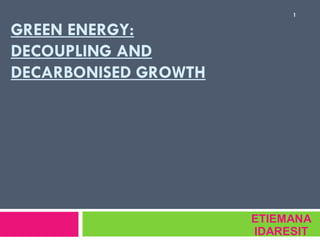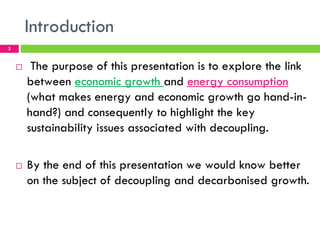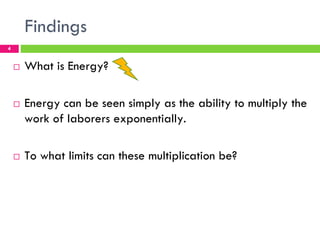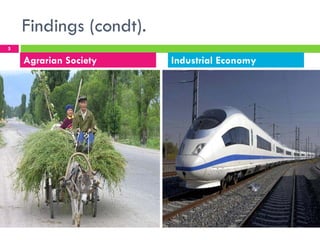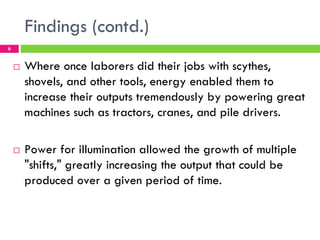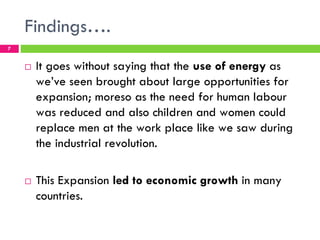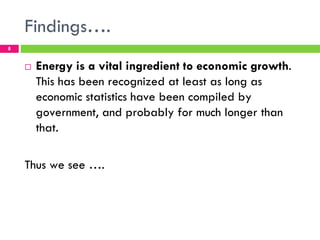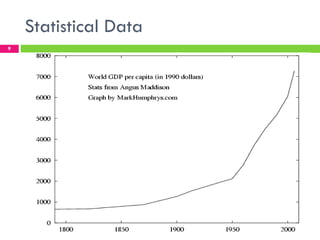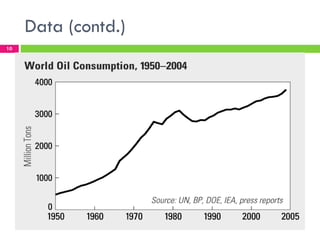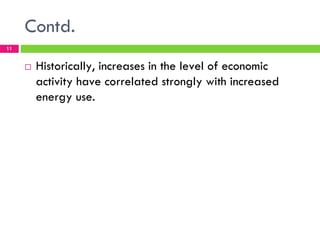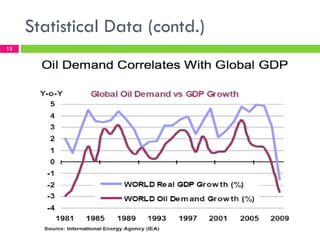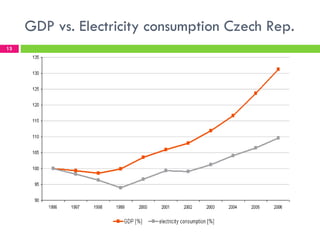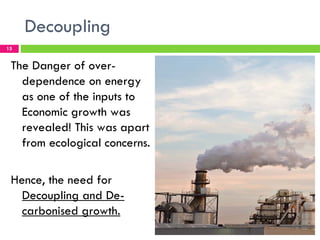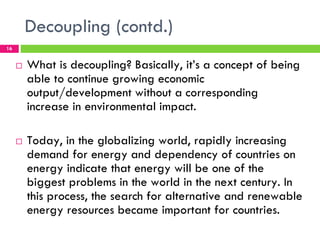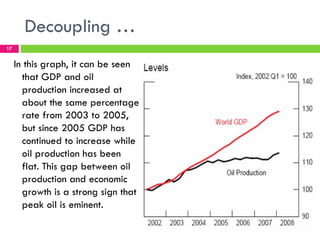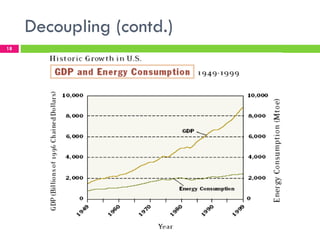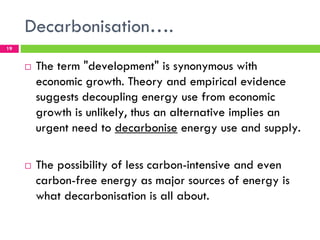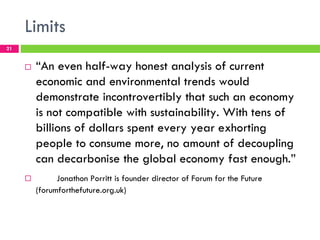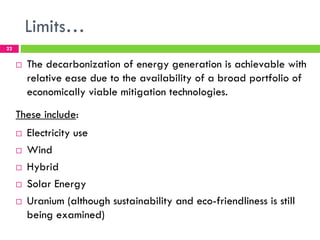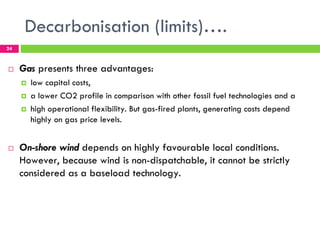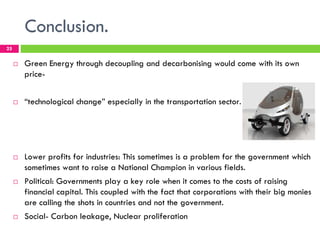Green Energy
- 1. 1 GREEN ENERGY: DECOUPLING AND DECARBONISED GROWTH ETIEMANA IDARESIT
- 2. Contents 2 ! Introduction ! Findings ! Statistical Data ! Decoupling and Decarbonised Growth ! Limits ! Conclusion
- 3. Introduction 3 ! The purpose of this presentation is to explore the link between economic growth and energy consumption (what makes energy and economic growth go hand-in- hand?) and consequently to highlight the key sustainability issues associated with decoupling. ! By the end of this presentation we would know better on the subject of decoupling and decarbonised growth.
- 4. Findings 4 ! What is Energy? ! Energy can be seen simply as the ability to multiply the work of laborers exponentially. ! To what limits can these multiplication be?
- 5. Findings (condt). 5 Agrarian Society Industrial Economy
- 6. Findings (contd.) 6 ! Where once laborers did their jobs with scythes, shovels, and other tools, energy enabled them to increase their outputs tremendously by powering great machines such as tractors, cranes, and pile drivers. ! Power for illumination allowed the growth of multiple "shifts," greatly increasing the output that could be produced over a given period of time.
- 7. Findings…. 7 ! It goes without saying that the use of energy as we’ve seen brought about large opportunities for expansion; moreso as the need for human labour was reduced and also children and women could replace men at the work place like we saw during the industrial revolution. ! This Expansion led to economic growth in many countries.
- 8. Findings…. 8 ! Energy is a vital ingredient to economic growth. This has been recognized at least as long as economic statistics have been compiled by government, and probably for much longer than that. Thus we see ….
- 10. Data (contd.) 10
- 11. Contd. 11 ! Historically, increases in the level of economic activity have correlated strongly with increased energy use.
- 13. GDP vs. Electricity consumption Czech Rep. 13
- 14. Contd. 14 ! In the 1973–1974 oil embargo, when oil-producing nations of the Middle East restricted supply and prices rose fourfold in a space of a few months. The resulting chaos in the oil-consuming economies of the industrialized West was widely considered to be a direct result of the embargo. In the United States alone, Gross Domestic Product—an accepted measure of economic activity—fell in 1974, after two decades of steady growth. The high cost and scarcity of oil was seen as the primary cause.
- 15. Decoupling 15 The Danger of over- dependence on energy as one of the inputs to Economic growth was revealed! This was apart from ecological concerns. Hence, the need for Decoupling and De- carbonised growth.
- 16. Decoupling (contd.) 16 ! What is decoupling? Basically, it’s a concept of being able to continue growing economic output/development without a corresponding increase in environmental impact. ! Today, in the globalizing world, rapidly increasing demand for energy and dependency of countries on energy indicate that energy will be one of the biggest problems in the world in the next century. In this process, the search for alternative and renewable energy resources became important for countries.
- 17. Decoupling … 17 In this graph, it can be seen that GDP and oil production increased at about the same percentage rate from 2003 to 2005, but since 2005 GDP has continued to increase while oil production has been flat. This gap between oil production and economic growth is a strong sign that peak oil is eminent.
- 19. Decarbonisation…. 19 ! The term "development" is synonymous with economic growth. Theory and empirical evidence suggests decoupling energy use from economic growth is unlikely, thus an alternative implies an urgent need to decarbonise energy use and supply. ! The possibility of less carbon-intensive and even carbon-free energy as major sources of energy is what decarbonisation is all about.
- 20. Decarbonisation …. 20 ! Decarbonisation Facts today: ! One fifth of the global carbon budget for the first half of this century has gone in just eight years ! Global carbon debt in 2000-8 roughly equivalent to the combined 2008 emissions of China and the US ! G20 need to cut carbon intensity levels by 35% by 2020 - four times the annual rate achieved in 2000-8 ! Global emissions from energy use need to peak by around 2015, declining to 2009 levels by 2020 ! Collective policy pledges of G20 stronger than before, but still may not be sufficient to get back on to a 2ºC trajectory by 2020
- 21. Limits 21 ! “An even half-way honest analysis of current economic and environmental trends would demonstrate incontrovertibly that such an economy is not compatible with sustainability. With tens of billions of dollars spent every year exhorting people to consume more, no amount of decoupling can decarbonise the global economy fast enough.” ! Jonathon Porritt is founder director of Forum for the Future (forumforthefuture.org.uk)
- 22. Limits… 22 ! The decarbonization of energy generation is achievable with relative ease due to the availability of a broad portfolio of economically viable mitigation technologies. These include: ! Electricity use ! Wind ! Hybrid ! Solar Energy ! Uranium (although sustainability and eco-friendliness is still being examined)
- 23. Decarbonisation (Limits)….. 23 ! Cost of Generating Electric Energy (Technology) ! Nuclear delivers significant amounts of very low-carbon baseload electricity at stable costs over time. Nuclear technology however requires high amounts of capital at risk as well as the cost of decommissioning and waste disposal together with social concerns about safety and proliferation. ! Coal with carbon capture, this is a process of capturing carbon dioxide (CO2) from large point sources such as fossil fuel power plants, and storing it away from the atmosphere by different means. However, storage doesn’t come without its own costs. This include, geological storage, ocean storage, mineral storage. And the highest risk is that of possible leakages. However, carbon capture has not yet been demonstrated at commercial scale for power plants.
- 24. Decarbonisation (limits)…. 24 ! Gas presents three advantages: ! low capital costs, ! a lower CO2 profile in comparison with other fossil fuel technologies and a ! high operational flexibility. But gas-fired plants, generating costs depend highly on gas price levels. ! On-shore wind depends on highly favourable local conditions. However, because wind is non-dispatchable, it cannot be strictly considered as a baseload technology.
- 25. Conclusion. 25 ! Green Energy through decoupling and decarbonising would come with its own price- ! “technological change” especially in the transportation sector. ! Lower profits for industries: This sometimes is a problem for the government which sometimes want to raise a National Champion in various fields. ! Political: Governments play a key role when it comes to the costs of raising financial capital. This coupled with the fact that corporations with their big monies are calling the shots in countries and not the government. ! Social- Carbon leakage, Nuclear proliferation
- 26. 26 Thank you!

